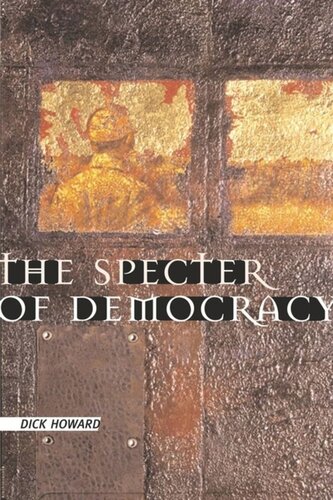

Most ebook files are in PDF format, so you can easily read them using various software such as Foxit Reader or directly on the Google Chrome browser.
Some ebook files are released by publishers in other formats such as .awz, .mobi, .epub, .fb2, etc. You may need to install specific software to read these formats on mobile/PC, such as Calibre.
Please read the tutorial at this link: https://ebookbell.com/faq
We offer FREE conversion to the popular formats you request; however, this may take some time. Therefore, right after payment, please email us, and we will try to provide the service as quickly as possible.
For some exceptional file formats or broken links (if any), please refrain from opening any disputes. Instead, email us first, and we will try to assist within a maximum of 6 hours.
EbookBell Team

4.3
88 reviewsIn this engaging and persuasive book, Dick Howard takes a critically innovative look at Marxism and its blind spots and rethinks the nature of democracy. He explores the attraction Marxism holds for intellectuals, examines two hundred years of democratic political life-focusing on the American and French Revolutions and the truly "revolutionary" aspects of those events-and rethinks Marx's contribution to democratic politics. Howard concludes that Marx was attempting a "philosophy by other means", and that, paradoxically, because he was such an astute philosopher Marx was unable to see the radical political implications of his own analyses. Howard offers a new way of thinking about democratic policy as a political ideal, positing that Marx could have seen this radical third way but did not.
In this rethinking of Marxism and its blind spots, Howard uses a critical rereading of Marx as a theorist of democracy to offer a new way to think about this political ideal. He argues that it is democracy, rather than Marxism, that is radical and revolutionary, and that Marx could have seen this but did not.
In this rethinking of Marxism and its blind spots, Dick Howard argues that the collapse of European communism in 1989 should not be identified with a victory for capitalism and makes possible a wholesale reevaluation of democratic politics in the U.S. and abroad. The author turns to the American and French Revolutions to uncover what was truly "revolutionary" about those events, arguing that two distinct styles of democratic life emerged, the implications of which were misinterpreted in light of the rise of communism.
Howard uses a critical rereading of Marx as a theorist of democracy to offer his audience a new way to think about this political ideal. He argues that it is democracy, rather than Marxism, that is radical and revolutionary, and that Marx could have seen this but did not. In Part I, Howard explores the attraction Marxism held for intellectuals, particularly French intellectuals, and he demonstrates how the critique of totalitarianism from a Marxist viewpoint allowed these intellectuals to see the radical nature of democracy. Part II examines two hundred years of democratic political life—comparing America's experience as a democracy to that of France. Part III offers a rethinking of Marx's contribution to democratic politics. Howard concludes that Marx was attempting a "philosophy by other means," and that paradoxically, just because he was such an astute philosopher, Marx was unable to see the radical political implications of his own analyses. The philosophically justified "revolution" turns out to be the basis of an anti-politics whose end was foreshadowed by the fall of European communism in 1989.